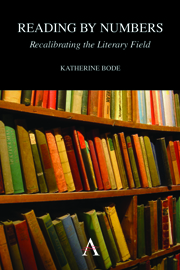Book contents
- Frontmatter
- Contents
- Acknowledgements
- List of Tables and Figures
- Introduction A New History of the Australian Novel
- Chapter 1 Literary Studies in the Digital Age
- Chapter 2 Beyond the Book: Publishing in the Nineteenth Century
- Chapter 3 Nostalgia and the Novel: Looking Back, Looking Forward
- Chapter 4 Recovering Gender: Rethinking the Nineteenth Century
- Chapter 5 The ‘Rise’ of the Woman Novelist: Popular and Literary Trends
- Conclusion Literary Studies in the Digital Future
- Notes
- Bibliography
- Index
Chapter 1 - Literary Studies in the Digital Age
- Frontmatter
- Contents
- Acknowledgements
- List of Tables and Figures
- Introduction A New History of the Australian Novel
- Chapter 1 Literary Studies in the Digital Age
- Chapter 2 Beyond the Book: Publishing in the Nineteenth Century
- Chapter 3 Nostalgia and the Novel: Looking Back, Looking Forward
- Chapter 4 Recovering Gender: Rethinking the Nineteenth Century
- Chapter 5 The ‘Rise’ of the Woman Novelist: Popular and Literary Trends
- Conclusion Literary Studies in the Digital Future
- Notes
- Bibliography
- Index
Summary
[T]here is no method, however well adapted to a given science, that literary history can transplant and apply to its own researches. The illusion that this is possible is responsible for much poor and childish work: statistics and charts, evolution of species, and quantitative analysis are processes, methods, and hypotheses excellent in their place, but their place is not literary history.
In the last decade, and especially in the last four or five years, the insistence in this epigraph – that quantitative methods have no place in literary history – has been repeated many times. The fact that this particular passage comes from a book first published in 1922, and intended as a guide for graduate students, should demonstrate that both the application of such methods, and the resistance to them, are of considerably longer standing in debates about literary history than is generally acknowledged. Nonetheless, discussion of quantitative methods has almost certainly never been as heated or as widespread – or as apparent to the majority of literary scholars – as it is today. While there are a number of quantitative approaches to literature, the current debate focuses on Franco Moretti's work in literary history. As Priya Joshi says, literary scholars have for a long time ‘regarded quantitative analysis with suspicion bordering on contempt’. But in the response to the publication in 2000 of Moretti's ‘Conjectures on World Literature’, and in 2005 of his book Graphs, Maps, Trees, this contempt has escalated – especially in the American humanities – to an intense stand-off.
- Type
- Chapter
- Information
- Reading by NumbersRecalibrating the Literary Field, pp. 7 - 26Publisher: Anthem PressPrint publication year: 2012



